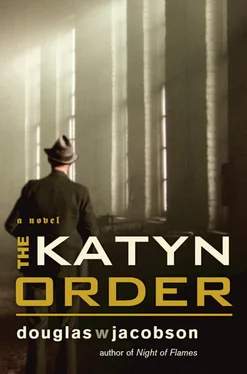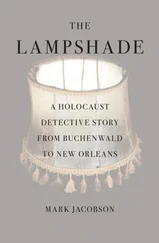Adam’s message had been delivered by special courier to Colonel Whitehall the day before, and he’d received a return message earlier this morning to expect Whitehall’s assistant, Tom Donavan. He’d spent most of the last twenty-four hours trying to sort out the stunning revelation about Banach and Hans Frank, but nothing made sense. Especially troubling was the date of his uncle’s release—July, 1940. Adam had been sent back to Poland by the SOE in the winter of 1940 and spent the next four years on his covert mission of murder, never knowing his uncle had survived Sachsenhausen and was back in Krakow. How many German officers had he assassinated avenging his death? Did it matter? They were all monsters who deserved to die, weren’t they?
Adam sighed, pulled back to the moment as a British army staff car pulled up in front of the house. Donavan exited from the backseat, wearing the same bow tie he’d worn in London and lugging a thick briefcase. They exchanged a brief greeting, and Adam led him to the library.
It was a dark, heavy room of walnut shelving laden with leather-bound books. A large, bronze plaque, emblazoned with the coat-of-arms of the Teutonic Knights, hung above a granite fireplace. They sat facing each other across a mahogany table.
“Your message was a bit of a shock, to say the least,” Donavan said without preamble. “Ludwik Banach released from Sachsenhausen by order of Hans Frank—quite extraordinary. If it gets out, it’ll cause quite a stir within SOE—and with the Polish Government in London, I should think. Whitehall’s keeping a lid on it for now, but it won’t last.”
Adam kept silent, though it was difficult. Cause a stir within SOE? What the hell did these people think it did to him?
“We’ve been doing some homework on Herr Frank since your call,” Donavan said. He opened the briefcase and pulled out a stack of papers. “Obviously, you have no idea why Frank would have ordered Banach’s release.”
“I can’t imagine,” Adam said. “Frank didn’t arrive in Krakow as governor until a month or two after my uncle’s arrest and my deportation from Poland.”
Donavan nodded. “Well, let’s review a bit about this chap, shall we? Our people have prepared a summary.” He pulled a pair of reading glasses from his shirt pocket and scanned the top page of the stack of documents. “Frank is a lawyer, one of Germany’s most noted jurists, a degree in economics, as well.” He ran his finger down the page. “… associated with fascists during his university years… joined the German Workers Party in 1919… became connected with National Socialist Party around 1928.”
Donavan continued flipping through the pages. “Hmmm… elected to the Reichstag in 1930… became president of the Reichstag after the Nazis came to power in 1933, appointed to the post by the Fuhrer himself.”
Donavan turned over the last page. “He served as the Reich Commissar for Administration of Justice, the Bavarian State Minister of Justice, and he was President of the Academy of German Law from 1933 until 1942. That’s quite—”
Adam held up his hand. “Excuse me, what did you just say?”
Donavan looked back at his notes. “He was the Bavarian—”
“No, the next thing.”
“Ah, he was the President of the Academy of German Law.”
Adam turned the words over in his mind, trying to remember.
“Does that mean something to you?” Donavan asked, peering over the top of his glasses.
“What were the dates?”
Donavan looked back at the notes. “1933 until 1942.”
Adam absently rubbed the thin scar on the left side of his face, though it was numb and he barely felt it. “Banach was very involved in the development of Poland’s judicial system,” he said, thinking back, reconstructing details from past conversations with his uncle. “He’d studied the system in Germany for many years. In one of his classes on constitutional law he talked about a conference he’d attended a few years earlier, in 1935, I believe. The conference was organized by this group, the Academy of German Law.” Adam paused. “Yes, I think that’s right, a conference of the Academy of German Law.”
Donavan frowned. “Are you sure? That was quite some time ago.”
“I was working as his legal assistant when he mentioned it in the class. I helped prepare his lecture notes. I’m sure it was this same organization. You say that Hans Frank was president of the academy?”
“He founded it.”
They were both silent for a long time as other things flitted through Adam’s memory, more bits and pieces, nothing that had ever seemed out of the ordinary—until now. “This academy, what was it all about?”
Donavan flipped through the file and pulled out another sheet. “The Academy of German Law… Frank organized it in the early thirties, I believe. Yes, here it is. That’s right, shortly after the National Socialists came to power. It included some of the most prominent legal scholars in Germany.” He scanned the document, speaking faster, as if he were warming up to the subject. “Their objective was to structure a legal framework that would preserve Germany’s independent judiciary within a totalitarian regime. The academy members consulted with other European legal scholars to safeguard these concepts within the National Socialist Government.”
Consulted with other legal scholars?
Donavan looked up from the paper. “What is it?… Mr. Nowak?”
“I think my uncle and Hans Frank knew each other,” Adam said. He could barely get the words out.
“Well, it’s possible they might have met, at this conference perhaps, but—”
“No, it’s more than that. This whole thing you just said, the part about an ‘independent judiciary within a totalitarian government.’ That was one of Banach’s major fields of expertise—the same kind of thing this academy was attempting to do. My uncle exchanged correspondence for years with some institution in Germany. I was his assistant, working in his office. I never paid much attention at the time, but I remember packets arriving with German postmarks.” He stared up at the ceiling. After a moment he looked back at the lanky Englishman. “My God, I think they really did know each other.”
Donavan got to his feet and shoved the files back in his briefcase. “We’d better arrange a secure telephone line to London.”
They telephoned Whitehall. Then, later in the day, Adam called him a second time, after spending several more hours with Donavan, digging through the stack of research files on Hans Frank. “We found something else,” Adam said.
“What is it?” Whitehall asked brusquely.
“A copy of a paper Hans Frank wrote in 1936 describing the circumvention of trial procedures in the Russian Bolshevik government, how the Russian courts were nothing more than pathetic pawns on the perilous chessboard of the NKVD.”
“Well, that’s damned poetic. But I don’t understand. What does it mean?”
“My uncle wrote a paper on the same subject a year earlier,” Adam replied. “The year he attended the conference in Germany.”
Whitehall grunted. “I still don’t—”
“He showed it to me,” Adam said quickly, recalling now with complete clarity a meeting one afternoon in his uncle’s office. “He kept the paper alongside a thick leather-bound book in his personal library— The Proceedings of the Academy of German Law. He wanted me to read the paper and give him my opinion. He didn’t do that very often.”
“Well, perhaps Frank was interested in the same subject, but—”
Adam interrupted. “It’s the phrase— pathetic pawns on the perilous chessboard —it all came back to me when I read Frank’s paper. Banach used the exact same phrase in his paper… a paper that was never published.”
Читать дальше












